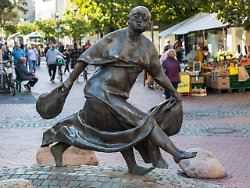Monday, November 1st, 2021
Less sales in September
Handel is hoping for Christmas time
The indicators of consumer sentiment are making retailers optimistic about the Christmas season. However, it is still not foreseeable whether all products will also be available.
The German retailers recorded surprisingly lower sales in September. The industry is now relying on consumers to buy more for the important Christmas business. At the end of the summer quarter, revenues fell nominally by 2.3 percent compared to August, according to the Federal Statistical Office. Excluding rising prices, there was a real minus of 2.5 percent, while economists had expected 0.6 percent growth here.
The consumption barometer of the retail association HDE signals a better mood among consumers in November after three declines. “For the time being, a good consumer mood is not a reliable signal for loose-fitting purses,” warned chief economist Alexander Krüger from Bankhaus Lampe. “If shop shelves are emptier because the logistics are sick, consumer wishes can be realized less naturally.”
Surveys recently showed that the global supply problems of important industrial intermediate products have now also reached the retail sector. “Not every Christmas present will be available,” said economic expert Klaus Wohlrabe from the Munich Ifo Institute recently.
Like the HDE, the GfK market researchers had also determined that consumers – despite the highest German inflation since the end of 1993 – go into November with a brighter buying mood. The last two months of the year are extremely important for many retailers as the holiday season.
Even online trading does less
Business in September was sobering in retailing goods of various kinds – such as department stores and department stores. There was a real drop in sales compared to the previous month of 4.3 percent. The trade in food, beverages and tobacco products had a price-adjusted 0.9 percent increase in sales, while the business with textiles, clothing, shoes and leather goods saw sales fall by 9.6 percent. The internet and mail order business, which has been booming since the Corona crisis, reported a decline of 2.0 percent. However, at a good 27 percent, sales in this division are still well above the level of February 2020, when the virus pandemic broke out in Germany and caused restrictions.
In the first nine months, total sales grew by 3.1 percent. Adjusted for inflation, there was an increase of 1.3 percent. Without further lockdowns and with a rather low number of infections, the trade association HDE expects growth of 1.5 percent to 586 billion euros for 2021. The high inflation of 4.5 percent is currently holding back the purchasing power of consumers.
According to a survey by the Sparkassenverband DSGV, almost three out of four Germans are already skeptical about the development of inflation. After all, almost 90 percent of the collective bargaining workers will get a Christmas bonus this year. On average, according to the Federal Statistical Office, this is 2,677 euros and thus 1.9 percent or 50 euros more than in the recession year 2020.
